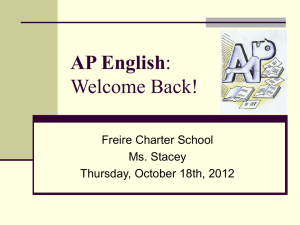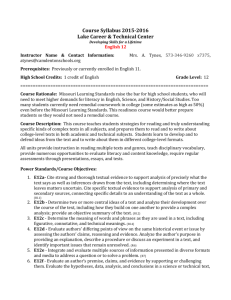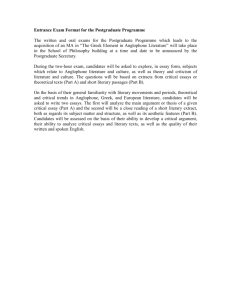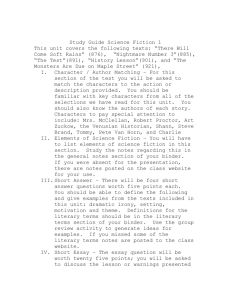English 12 Honors Syllabus
advertisement
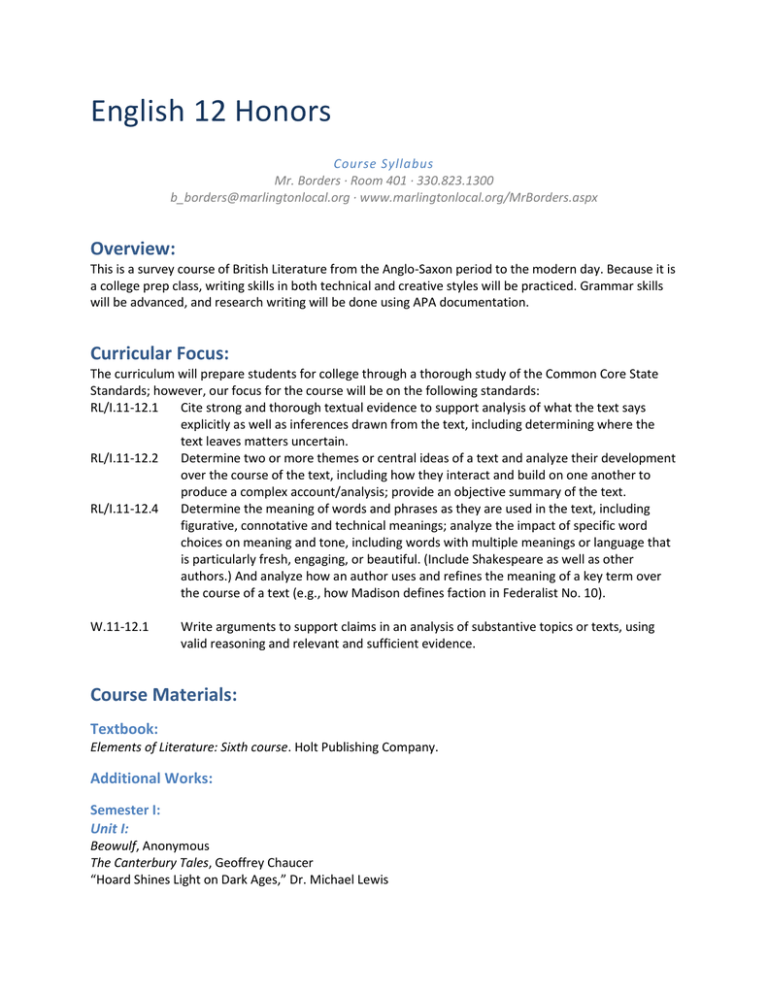
English 12 Honors Course Syllabus Mr. Borders ∙ Room 401 ∙ 330.823.1300 b_borders@marlingtonlocal.org ∙ www.marlingtonlocal.org/MrBorders.aspx Overview: This is a survey course of British Literature from the Anglo-Saxon period to the modern day. Because it is a college prep class, writing skills in both technical and creative styles will be practiced. Grammar skills will be advanced, and research writing will be done using APA documentation. Curricular Focus: The curriculum will prepare students for college through a thorough study of the Common Core State Standards; however, our focus for the course will be on the following standards: RL/I.11-12.1 Cite strong and thorough textual evidence to support analysis of what the text says explicitly as well as inferences drawn from the text, including determining where the text leaves matters uncertain. RL/I.11-12.2 Determine two or more themes or central ideas of a text and analyze their development over the course of the text, including how they interact and build on one another to produce a complex account/analysis; provide an objective summary of the text. RL/I.11-12.4 Determine the meaning of words and phrases as they are used in the text, including figurative, connotative and technical meanings; analyze the impact of specific word choices on meaning and tone, including words with multiple meanings or language that is particularly fresh, engaging, or beautiful. (Include Shakespeare as well as other authors.) And analyze how an author uses and refines the meaning of a key term over the course of a text (e.g., how Madison defines faction in Federalist No. 10). W.11-12.1 Write arguments to support claims in an analysis of substantive topics or texts, using valid reasoning and relevant and sufficient evidence. Course Materials: Textbook: Elements of Literature: Sixth course. Holt Publishing Company. Additional Works: Semester I: Unit I: Beowulf, Anonymous The Canterbury Tales, Geoffrey Chaucer “Hoard Shines Light on Dark Ages,” Dr. Michael Lewis “Huge Anglo-Saxon Gold Hoard Found,” BBC Maestà, Cimabue Maestà, Duccio Arena (Scrovegni) Chapel fresco, Padua (after 1305): Joachim Among the Shepards, Meeting at the Golden Gate, Raising of Lazarus, Jonah Swallowed Up by the Whale, Giotto Gates of Paradise, Lorenzo Ghiberti The Tribute Money at the Brancacci Chapel, Florence, Masaccio Unit II: Othello, The Moor of Venice, William Shakespeare Various sonnets, William Shakespeare On the Divine Proportion, Luca Pacioli David, Michelangelo di Lodovico Buonarroti Simoni The Niccolini-Cowper Madonna, Raffaello Sanzio da Urbina Mona Lisa, Leonardo da Vinci Vitruvian Man, Leonardo da Vinci The Last Judgment, Michelangelo di Lodovico Buonarroti Simoni The Virgin and Child with St. Anne, Leonardo da Vinci Deposition from the Cross (Entombment), Jacopo da Pontormo Ecstasy of Saint Teresa, Giovanni Lorenzo Bernini Unit III: A Midsummer Night’s Dream, William Shakespeare Various poems, John Donne Girl with a Pearl Earring, Johannes Vermeer Et in Arcadia Ego, Nicolas Poussin The Debarkation at Marseilles, Peter Paul Rubens The Nightwatch, Rembrandt van Rijn Semester II: Unit IV: Various poems, William Blake Various poems, Alfred Lord Tennyson Various poems, William Wordsworth “The Deserted Village,” Oliver Goldsmith Morning in the Tropics, Frederic Edwin Church The Progress of Love: The Pursuit, Jean Honore-Fragonard Seascape Study with Rain Cloud, John Constable Watson and the Shark, John Singleton Copley Unit V: “Dover Beach,” Matthew Arnold “Sonnet 43,” Elizabeth Barrett Browning “My Last Duchess,” Robert Browning “Once Upon a Time,” Nadine Gordimer Arrangement in Gray and Black: The Artist’s Mother, James McNeill Whistler Mother of Pearl and Silver: The Andalusian, James McNeill Whistler Symphony in Flesh Colour and Pink: Portrait of Mrs. Frances Leyland, James McNeill Whistler Symphony in White, No. 1: The White Girl, James McNeill Whistler Unit VI: The Metamorphosis, Franz Kafka “Dulce et Decorum Est,” Wilfred Owen “Digging,” Seamus Heaney “The Unknown Citizen,” W. H. Auden “The Fallacy of Success,” G.K. Chesterton “Their Finest Hour,” Winston Churchill “Rocking-Horse Winner,” D.H. Lawrence “Araby,” James Joyce Blue Nude, Henri Matisse The Potato, Joan Miro Reading at a Table, Pablo Picasso Composition No. III, Piet Mondrian *Other canonical and modern texts, essays, and the like may be read throughout the year or chosen for the research project, if approved. Other Materials: You will need a 3-ring notebook (recommended dividing into the following sections): 1. Notes 2. Literary Terms 3. Compositions 4. Homework 5. Vocabulary Bring your current reading materials, notebook, and pen or pencil to class each day. Grading: Assignments and Homework: All assignments must be turned in on or before the due date. If you know you will be absent, turn in your work early or have someone else turn it in for you. Late work will not be accepted! Make-Up Work: All assignments will be listed on-line (Web site listed at top of syllabus). You must check the assignments when you return to class after an absence and make any necessary arrangements to take quizzes, tests, etc. Scale/Weighting: A B+ B BC+ C 92-100% 89-91% 86-88% 83-85% 80-82% 77-79% 4.500 3.850 3.500 3.225 2.925 2.500 80% 40% Compositions 30% Tests 20% Quizzes 10% Homework 20% Two 9-Week Tests (10% each) SLO Exam (15%) & 9-Week Test (5%) CD+ D DF 74-76% 71-73% 68-71% 65-67% below 65% 2.225 1.425 1.000 0.875 0.000 Academic Outline: Ongoing Assessments Independent Reading Assignments: There will be an emphasis on the writing process, with discussions and practice in revision and use of style as a priority. This emphasis will include class discussions, individual conferences, and peer revision. Each assignment will include writing in the form of a literary analysis (detailed further in “Composition and Language Skills”). Vocabulary: Students will be learning vocabulary as needed, based on the literature used in each particular unit. There will be an emphasis on understanding not just the denotation of words in literary works, but the connotation of those words as well. This study of diction will apply both to the reading of assigned literature (where professional writers model their skills in usage) and to the students’ writing samples as well. The end result should be two-fold: first, a heightening of the students’ appreciation for effectively used diction in literary works and secondly, an improvement in the students’ understanding of diction and usage in their own writing samples. Literary Terms: In addition to vocabulary study, literary terms will be assigned each week; quizzes will be given biweekly on Thursdays. This portion of study will not only develop students’ enjoyment of literature, but also their ability to think critically, write successfully, discuss effectively, etc. Composition and Language Skills: We will use various texts as resources for modeling the various modes of writing. These resources will also be used as models for the revision process as students write for a variety of purposes including analysis, synthesis, argumentative, and informative essays. Composition assignments will include at least one longer essay per semester—using APA style parenthetical citations and a Bibliography page— germane to the students’ independent reading, which may be any of the following writing assignments: expository, analytical, or argumentative. Each paper will receive feedback, conferencing, peer feedback, and will be available for revision. For revision credit, students MUST improve their papers beyond the mundane spelling, grammar, etc. Specifically, students need to think about how to improve their arguments, organization, and rhetoric. First Semester Unit Breakdown by Week: “What Is Good Writing?” Introduction: “Course Introduction” (Week 1) Overview: In this unit students will work with their previously read texts to learn to improve their skills of analysis through various teaching strategies, including class discussions; think, pair, and share; and small group discussions. Specifically, students will be gaining an understanding of the thought complexity level this course requires. Unit I: Middle Ages (Weeks 1-6) Overview: Although the Middle Ages often is characterized as a period of darkness, the literature and art of the time typically suggest a more complex picture. Through a combination of close reading and exposure to an array of texts, students observe how satire reveals some of the contradictions and divergences within medieval literature and will draw connections between literary form and philosophy. In addition, they consider how certain traits of medieval literature can also be found in the art of the period: for instance, how characters have symbolic meaning both in literature and in iconography. Students write essays in which they analyze a work closely, compare two works, or trace an idea or theme throughout the works they have read. Unit II: Renaissance and Reformation (Weeks 7-12) Overview: Students consider Renaissance writers’ interest in ancient Greek and Latin literature and myth; their preoccupation with human concerns and life on earth; their aesthetic principles of harmony, balance, and divine proportion; and exceptions to all of these. This leads to a discussion of how literary forms themselves reflect religious, philosophical, and aesthetic principles. As students compare the works of the Renaissance with those of the Middle Ages, students recognize the overlap and continuity of these periods. In addition, they consider how the outstanding works of the era transcend their time and continue to inspire readers and writers. The English Renaissance of the seventeenth century includes additional works by William Shakespeare. In their essays, students may analyze the ideas, principles, and form of a literary work; discuss how a work bears attributes of both the Middle Ages and the Renaissance; discuss convergences of Renaissance literature and arts; or pursue a related topic of interest. Unit III: Seventeenth Century (Weeks 13-18) Overview: Students gain understanding of the early Enlightenment and its conception of reason. They see another side of the thought and literature of this period: an emphasis on human emotion, irrationality, and paradox. They consider how certain works express tension or conflict between emotion and reason while others present reason and emotion as complementary and interdependent. They will write a critical essay exploring an aspect of the conflict between reason and emotion. Or teachers might choose to culminate the unit with a research paper that answers the essential question. Second Semester Research Paper: Students will create a thesis and write a researched literary analysis essay that is based on a minimum of five citations. The essay will be 10-12 pages long, including both parenthetical citations and a Bibliography page in APA format. Students will be required to submit a rough draft two weeks prior to the submission of the final paper. One week before the final paper is due, students MUST conference with the teacher to discuss possible improvements and successes. Finally, students will submit their final copy along with their rough draft. Unit Breakdown by Week: “What Is the American Dream?” Unit IV: Eighteenth and Early Nineteenth Centuries (Weeks 1-4) Overview: Observing themes related to nature as well as “natural” forms and language, students consider whether nature appears as a force of good or a menace. Observing narrative digressions, idiosyncrasies, exaggerations, and biases, they consider human, unpredictable, idiosyncratic aspects of storytelling. They have the opportunity to practice some of these narrative techniques in their own fiction and nonfiction writing. Students also explore some of the philosophical ideas in the literary texts—questions of free will, fate, human conflict, and loss. In seminar discussion, students consider a philosophical question in relation to a particular text. Students write short essays and also develop an essay or topic from an earlier unit, refining the thesis and consulting additional sources. These essays can be used to inform and inspire longer research papers at the end of the unit that answer the essential question. By the end of this unit, students will have an appreciation for some of the tendencies of early Romanticism and will recognize that this era, like all others, is filled with exceptions, contradictions, and subtleties. Unit V: Nineteenth Century (Weeks 5-12) Objectives: They will explore both form and meaning of literary works and consider historical context. Through close reading of selected texts, students will see how subtle narrative and stylistic details contribute to the meaning of the whole. They will consider how certain poems of this unit are intimate on the one hand and reflective of a larger civilization on the other. Moral conflicts and subtle psychological portrayals of characters will be another area of focus; students will consider how novels of the nineteenth century develop character and how their conflicts are both universal and culturally bound. Students will also have the opportunity to develop a research paper from earlier in the year and to write a shorter essay on topic from the unit. In their essays, students will continue to strive for precision and clarity, paying close attention to the nuances of words. Unit VI: Twentieth Century (Weeks 13-18) Objectives: Through the close reading of “dystopian” works such as Pygmalion, 1984, and Rhinoceros, students consider the problems inherent in fashioning a perfect society or perfect individual. At the same time, they also consider how authors of the twentieth century affirm the possibility of beauty and meaning—for instance, in Eliot’s Four Quartets, Federico García Lorca’s Poem of the Deep Song, or Thomas Hardy’s “The Darkling Thrush.” To gain a deeper appreciation of the role of beauty in twentiethcentury literature, they appraise connections between poetry and music: for instance, the relation of Eliot’s Four Quartets to a Beethoven quartet, and the relation of Federico García Lorca’s poetry to the rhythms of flamenco music. Examining how authors rework classical stories and themes (e.g., in Anouilh’s Antigone or Camus’ Caligula), students ponder how historical context affects an enduring story or theme. Students complete research papers in which they consult literary criticism and historical materials. They engage in discussions resembling college seminars, where they pursue focused questions in depth over the course of one or two class sessions. At the close of the unit, students have the opportunity to research the literature they have read over the course of the year and the concepts they have studied. Parent/Student Summary Important Dates Thursdays are important; students will be taking literary terms quizzes or doing ACT preparation (reading, grammar, writing—with emphasis on writing). Important Information Assigned readings are important—as are assigned homework and studying. Being that this is an honors-level class, late work will not be accepted. I expect your best effort on everything you do, and I understand that some material is very difficult. Therefore, if your best effort isn’t up to your (and my) standards, a different retake over the material will be allowed (and expected). Parent/Guardian Signature: ____________________________________ Date: ______________ Student Signature: ______________________________________________ Date: ______________



